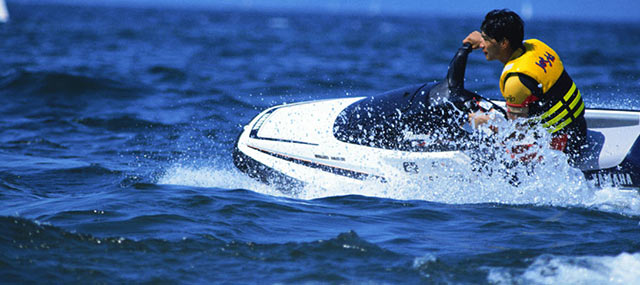It’s hard to believe, but the end of summer is upon us. The kids have gone back to school and before you know it, the temperature will drop. That also means it’s time to store away our favorite summer toys and personal watercraft.
Even though we live in sunny southern California, you may not be use your personal watercraft and recreational vehicles as often. Many people choose to store their watercraft during the cool, rainy winter and update their insurance policy to save some dough. Atlas Plus Insurance has some tips to share when it comes to storing a boat, waverunner, jetski, seadoo or other personal watercrafts.
Prevent rust on internal engine parts, protect the fuel system, extend the life of your battery and maintain your craft’s exterior finishes. It may sound like a complicated process, but we assure you that it will be easy to prepare your summer watercraft for storage in a public garage or at home. Proper storage is essential to ensure your personal watercraft is ready to run again come spring.
Checklist for Personal Watercraft Care & Maintenance for Storage
Most of these tips for care and maintenance of a personal watercraft are easy enough to Do-It-Yourself (DIY), however, unless you are an experienced mechanic, you will want to have your engine serviced by a professional. Just as you regularly service your car engine, you will have your watercraft engine fluids inspected, drain excess water, have the engine fogged and lubricate fittings to prevent any damage which could likely render the vehicle inoperable.
Beyond the engine, however, there are numerous services you can perform yourself. Let’s take a look…
Clean and Prepare Your Personal Watercraft
- Scrub down and thoroughly clean your boat from top to bottom, from the inside out. If you use your craft in salt water, wash it with fresh water after use.
- Be sure to keep it waxed and sealed. Those decals don’t like the cold weather that much and tend to shrink; a good coat of wax will help a lot.
- Check over the hull with a fine tooth comb to see if there are any cracks, holes or loose hardware.
- Clean your seats and covers with any all-purpose cleaner and treat them with a protectant (such as ARmor All) to seal out dust and dirt.
- If you are going to store your craft for more than a month it is a good idea to keep your seat and any removable covers made of vinyl/plastic, etc. in your home garage where it is warm. This will keep them from shrinking or cracking.
- Air out your craft to avoid any damp areas or moisture. You want to store a DRY watercraft!
- Remove and store all electronics, such as the GPS system, radios and entertainment systems at home in a safe and dry place.
- Cover your personal watercraft before storage to prevent sun, dust or extensive water damage.
Inspection and Maintenance
- Check your engine coolant and oil levels. *Monitor throughout winter for any leaks.
- Consider adding a good quality fuel stabilizer to your gas tank and run the engine for a short time. Most manufacturers suggest topping off the run tank for storage to prevent excessive condensation.
- Check your battery for corrosion or leaking battery fluids. If you find corrosion, be sure to brush it off with a wire brush and rinse the battery with fresh water.
- Inspect your cables for damage. Pull the throttle and inspect both ends to see if they are frayed.
- Check the steering with a hard turn hard left then right. Be sure to lube the cable to force any trapped water out and greatly extend the life of the cable.
- Check the prop along with the bore of the pump for any damage.
- Check your trailer for cracks. Leave the tires inflated with at least 20 lb. of pressure, and put the frame up on blocks so that the tires are not sitting on the ground for months. Seal and re-grease any tire bearings.
Storing Your Personal Watercraft
- Do not store your personal watercraft in the water! There are plenty of affordable marinas and storage facilities around southern California. You always have the option of storing it at your home if you have appropriate space.
If you follow refer to your manufacturer’s recommendations, have your engine serviced by a professional and run through your maintenance checklist, you are sure to be first on the water next season!
Ask Atlas Plus Insurance for Assistance with Insurance
While your personal watercraft is not being used, you may be able to get a break on your insurance. Please do not hesitate to give us a call. The Atlas Plus Insurance team of friendly experts would be more than happy to answer all of your insurance-related questions!

